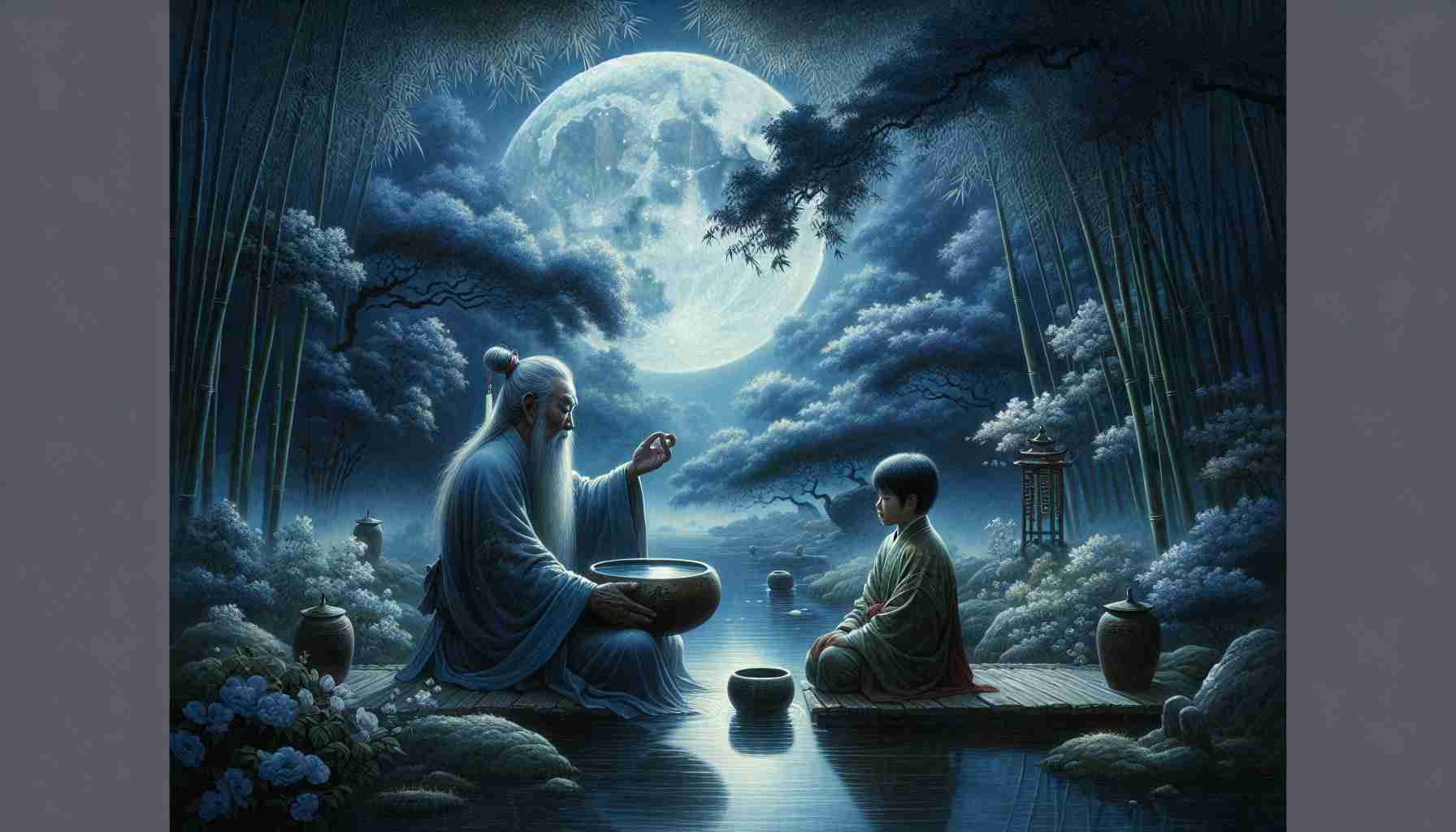

The night I first saw the moon in the bowl was the night I began to understand stillness.
I was ten years old, living in the quiet hills of ancient China. My grandfather, an old gardener with a long silver beard and hands as rough as bark, always sat by the pond at sunset. He didn’t speak much, but every now and then, he would say something strange that stayed in your mind, like a song you can’t forget.
That evening, I was upset. My younger brother had taken my scroll of sketches and spilled water on it. I had worked all day on those drawings—trees, birds, even a little dragon tucked behind the clouds. I stormed out of the house and found Grandpa beside the pond, holding a bowl of water in his lap.
He didn’t say a word. That made me more annoyed.
“What’s the point of painting or drawing if someone just ruins it?” I huffed.
Still, he said nothing. Just gently swirled the water in the bowl.
“Are you even listening?” I asked.
He held the bowl up so I could see. The moon’s reflection floated on the water like a silver coin.
“If you stir it,” he finally said, “you lose the moon.”
I frowned. “What?”
He dipped his fingers in and stirred gently. The moon rippled and broke into shimmering pieces.
“Anger is like this,” he said. “When you stir too much, you can’t see clearly. Stillness lets you see the whole moon.”
I stared at the bowl. After a moment, the water calmed. The moon was perfect again, sitting quietly in its little sky.
For once, I didn’t say anything back.
We sat there, watching the bowl. Crickets played their tiny music. The wind whispered through bamboo leaves. It felt like time had stopped just to listen.
Later, as I walked back to the house, I didn’t feel angry anymore. I passed my brother, who looked scared and sorry. He held something behind his back.
My ruined scroll.
“I’m sorry,” he whispered. "I made you a new one."
It was full of crooked little birds and lopsided trees—but the dragon was there, smiling behind the clouds.
I smiled too. “It’s perfect.”
That night, I went back to Grandpa.
“Is the moon always in the bowl?” I asked.
He chuckled. “Only if the water is still. And if your heart is still, you’ll see more than the moon.”
I didn’t fully understand what he meant then. But over time, I began to notice things I hadn’t before—the way the leaves swayed without trying, how the clouds moved without rushing, how the world sang its song without noise.
And now, anytime I feel like yelling or stomping, I pause. I remember the moon in the bowl. I stop stirring the water.
I let things be still.
And somehow, that’s when I see the clearest.
The night I first saw the moon in the bowl was the night I began to understand stillness.
I was ten years old, living in the quiet hills of ancient China. My grandfather, an old gardener with a long silver beard and hands as rough as bark, always sat by the pond at sunset. He didn’t speak much, but every now and then, he would say something strange that stayed in your mind, like a song you can’t forget.
That evening, I was upset. My younger brother had taken my scroll of sketches and spilled water on it. I had worked all day on those drawings—trees, birds, even a little dragon tucked behind the clouds. I stormed out of the house and found Grandpa beside the pond, holding a bowl of water in his lap.
He didn’t say a word. That made me more annoyed.
“What’s the point of painting or drawing if someone just ruins it?” I huffed.
Still, he said nothing. Just gently swirled the water in the bowl.
“Are you even listening?” I asked.
He held the bowl up so I could see. The moon’s reflection floated on the water like a silver coin.
“If you stir it,” he finally said, “you lose the moon.”
I frowned. “What?”
He dipped his fingers in and stirred gently. The moon rippled and broke into shimmering pieces.
“Anger is like this,” he said. “When you stir too much, you can’t see clearly. Stillness lets you see the whole moon.”
I stared at the bowl. After a moment, the water calmed. The moon was perfect again, sitting quietly in its little sky.
For once, I didn’t say anything back.
We sat there, watching the bowl. Crickets played their tiny music. The wind whispered through bamboo leaves. It felt like time had stopped just to listen.
Later, as I walked back to the house, I didn’t feel angry anymore. I passed my brother, who looked scared and sorry. He held something behind his back.
My ruined scroll.
“I’m sorry,” he whispered. "I made you a new one."
It was full of crooked little birds and lopsided trees—but the dragon was there, smiling behind the clouds.
I smiled too. “It’s perfect.”
That night, I went back to Grandpa.
“Is the moon always in the bowl?” I asked.
He chuckled. “Only if the water is still. And if your heart is still, you’ll see more than the moon.”
I didn’t fully understand what he meant then. But over time, I began to notice things I hadn’t before—the way the leaves swayed without trying, how the clouds moved without rushing, how the world sang its song without noise.
And now, anytime I feel like yelling or stomping, I pause. I remember the moon in the bowl. I stop stirring the water.
I let things be still.
And somehow, that’s when I see the clearest.